The Equip Initiative at the Annenberg Physician Training Program offers education in substance misuse, substance use disorders, prevention, and related public health issues aimed at:
- Addictionologists (physicians who specialize in Addiction Medicine)
- Physician specialists, including Psychiatrists, Preventionists, and Emergency Medicine physicians
- Primary Care Physicians and other physicians across specialties
- Physicians in training and other providers in training and practice
- Learning communities that train physicians and other healthcare providers
To reach these audiences, we work with:
- Residency Programs: Through consultation with partner institutions, the best combination of courses, including courses in addiction medicine and addiction psychiatry, are in development for residents in an effort to produce more board-certified specialists.
- Medical Schools: Medical school courses containing curricular threading in addiction continue to be created. The curricular threading components are meant to enhance knowledge, attitudes, behaviors, and skills related to the treatment of substance use disorders while enhancing the healthy habits of physicians and their teams, helping to ensure that all physicians are ready and willing to prevent and treat addictive disease in their patient populations and in the wider community.
- Professional Development: Continuous training of physicians is an important aspect of this program. As new technologies and treatments are developed and new research surfaces, physicians and other healthcare workers require updated training to remain relevant and provide the best care to their patients. All physicians are now encouraged to treat patients with substance use disorders, and many need new skills and knowledge to meet the needs of their patient populations. Our courses are designed to support practicing physicians in their clinical work.
- Undergraduate Healthcare Education: Understanding the need to introduce medical and other healthcare students to substance use disorders, we provide undergraduate courses. As with all of our health content, curricular threading of addiction content is present, thus exposing students early to the disorders and their treatment and prevention.
- Public Health Programs: The impact of SUDs on public health cannot be ignored, and for many patients, their first introduction to the health system is through the public health system. Thus, the development of content for public health is critical to the APTP program.
- Policy Education: Working with partners, we educate physicians and policymakers so that they can make evidence-based decisions that will improve care and prevent substance use disorders. This is achieved through the production of peer-reviewed articles, as well as the development and delivery of courses such as the one produced in collaboration with WHO/PAHO on Tobacco Legislation.

